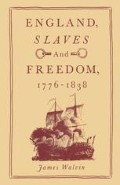Abstract
Historians of slavery have long been curious about the relationship between slavery and freedom.1 Many historians, and large numbers of modern students, have been particularly intrigued (and puzzled) by the mentality of people in past time who were able to justify the slavery of others while extolling their own rights of liberties and freedom. What, to the modern Western eye, might seem inconsistent — a contradiction in attitudes and behaviour — was not of course necessarily equally obvious to people in the past. In the British case, black slavery thrived for more than two centuries in the West Indian settlements and did so, for much of its history, with relatively few objections (of any kind). Yet the years when the British slave empire emerged and prospered were also the years when political life in Britain was characterised by a long-protracted, vocal and insistent struggle for a wide range of political and social rights. By the time the major Caribbean islands had been transformed into black slave societies producing tropical staples for the benefit of the metropolis, that same metropolis had witnessed — among other changes — the triumph of parliamentary over monarchical power, and the passing of the Habeas Corpus Act in 1679. However limited those political and social rights might now seem — however hemmed in by the restraints of property, and access to them limited by poverty — contemporaries took great pride in them; the liberties of the British were viewed as the achievements of (and justification for) the years of revolution and turmoil.
Access this chapter
Tax calculation will be finalised at checkout
Purchases are for personal use only
Preview
Unable to display preview. Download preview PDF.
Notes
For the most recent analysis, see Orlando Patterson, Slavery and Social Death (Cambridge, Mass., 1983).
James Walvin, ‘The Propaganda of Anti-Slavery’, James Walvin (ed.), Slavery and British Society, 1776–1846 (London, 1982).
G.E. Aylmer (ed.), The Levellers (London, 1975)
Christopher Hill, The World Turned Upside Down (London, 1975).
Christopher Hill, ‘The Norman Yoke’, in J. Saville (ed.), Democracy and the Labour Movement (London, 1954).
Abolitionist Petitions (1830) in Journal of the House of Lords, vol. LXIII (1830) p. 101.
Author information
Authors and Affiliations
Copyright information
© 1986 James Walvin
About this chapter
Cite this chapter
Walvin, J. (1986). Slavery and a Free Land. In: England, Slaves and Freedom, 1776–1838. Palgrave Macmillan, London. https://doi.org/10.1007/978-1-349-08191-2_2
Download citation
DOI: https://doi.org/10.1007/978-1-349-08191-2_2
Publisher Name: Palgrave Macmillan, London
Print ISBN: 978-1-349-08193-6
Online ISBN: 978-1-349-08191-2
eBook Packages: Palgrave Political & Intern. Studies CollectionPolitical Science and International Studies (R0)

